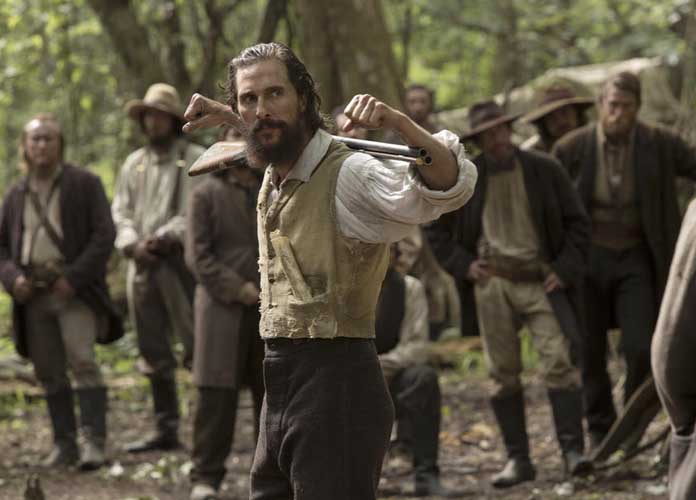‘Free State Of Jones’ BluRay Review: Tragic-Yet-True Tale Tale For Civil War Buffs

3/5
If you’re a fan of Civil War movies, Free State of Jones is for you. If you’re anybody else, it’s painful and emotionally exhausting.
The opening scene shows a brutal, gore-filled version of the Civil War: a man is shot in the face, you see the aftermath of a man who no longer has a face, and the nurse’s office featuring all kinds of disturbing operations.
>BUY NOW: THE FREE STATE OF JONES BLU-RAY
The main character Newton Knight, a nurse for the Confederacy, finds out that they can exchange a “negro” for a way out of the war. Daniel comes to tell him that they, probably the government, has stolen everything from him and told him he was drafted. The next day, he tries to navigate Daniel through the trench and the battlefield. He meets with a general, and Daniel is immediately shot through the abdomen. After carrying him all the way back, nobody in the doctor’s office can help him, as they are busy helping others. He tells him the whole time “you aren’t going to die,” and then he dies. When his friend Will, obsessed with honor, tells him he died with honor, Knight says “no, Will. He just died.”
Knight then travels to Mississippi to present his body to his mother. The mother, Serena, then has more or less everything stolen from her by soldiers. As cheerful as this movie is, it certainly gives you a powerful perspective on how much war takes away, how a massacre of human life isn’t honorable, it’s unfair, undignified and painful.
After giving a woman gold as thanks for her help. Suddenly, we are transported 85 years later to a case, where they state how one of Knight’s descendants is 1/8th African American, foreshadowing that Knight will marry a black woman. We are then back to the Civil War where another household is faced with being robbed by the Confederacy. Knight gives a woman and girls guns, and the 5 of them effectively hold off the smug soldier.
They send dogs after him, one gets his leg, and he stabs it to death. A woman treats his leg, and a black man helps him get food in his house in the swamps. Knight almost gets bitten by a snake, and the black man says “they will be here for you soon.” He waits all day, and at night the woman who helped him before, Rachel, meets him. They navigate through the swamp and he meets with Moses, who looks like he has a chair stuck on his head, fixes his wounds. Serena Knight finds out his husband is wanted by the law. The court scene is shown once more, explaining that he and his wife were thousands of miles away at the time.
As Knight hangs out with the others, while Rachel tries to learn how to read by watching the little girls but is caught by her slave owner red handed. Later, she steals molasses and gives it to Moses and Knight. Knight and Moses, who has a giant iron contraption around his next used to keep him hostage, share stories, and Knight says he can get the ridiculous ornament off of him, as he used to be a blacksmith. Moses is hesitant, but agrees, and Knight gives the other wanted African Americans guns. They fend off the slave dogs and eat them, providing a romantic occasion for Rachel and Knight, teaching her how to use a gun the next day. I feel like the movie really didn’t explain important details – that the African Americans were slaves, just as they didn’t explain Serena and Newton they were married, which seems kind of crucial, as it would mean Daniel was their son. I still don’t fully understand certain parts of the movie, such as how the next scene is literally just a historical slideshow of events in July 1863.
The soldiers who were old friends and still alive, after losing Vicksburg, join Knight and his gang of deserting misfits. They meet the same soldier that Knight fended off from the house before, calling himself the Freeman of Jones County. They block off the road and hide in the trees, forcing them to give back the stolen goods from the wagon. When the soldier tells his supervising Colonel, he is unimpressed and disinterested. As Knight builds his small army, men and boys alike look up to him, as Newton promotes a teenager to corporal rank.
Knight gets Rachel a book, teaching her to read. The support for Knight’s cause grows further. After the Confederates eventually find and take all the corn meant for the camp, Knight once again meets the man who took the resources from his house, and stands up to him with 100 civilian soldiers. Never has a robbery felt so good to watch.
After meeting with the Colonel again, the Colonel notices smoke in the sky and is uncertain whether to take them on. They have a party as they drink and eat pork, and in the aftermath of the party, Knight defends an African American from being degraded. The Colonel demands the resignation of Knight’s “company,” offering a woman to send the message for a reward. After they reply “no thanks,” the woman’s house is instead burned down. Knight, in turn, burns their stolen goods.
This turns into a burn-off, and the resulting internal conflict causes the previous farm owner to leave. The owner and his sons are immediately hanged by the Confederacy. Knight is infuriated, feeling like they are the slaves of the rich. The confederacy stays at the funeral for the boys they murdered, waiting for the Freemen to appear.
They are surprised when the women transporting the caskets pull out guns and African Americans hiding in the casket jump out. The graveyard is turned into a, well, graveyard, as a wounded Colonel gets away. Knight chases him into the church, slowly, where he misses intentionally to watch him struggle. The colonel says he knew his dad as he strangles him with his belt. He drags his limp body out .
On to Ellisville, Mississippi, March 1864, a battle scene accompanies the eventual victory of Knight’s troops as they lower the Confederate flag and raise the American flag. The citizens take the town for themselves, and the rich are forced to flee the area. At a party, Knight plans to get guns and mortars, later having sexy crying time with Rachel. Yippee-ki-yay!
The body of the Colonel is given to the Confederacy, placed on a table. Colonel Lawrey marches with one thousand men towards Ellisville to kill the Freemen. Will tells Knight of the impending doom, and Knight gives Will his best gun. Knight tells the men and women of the army, but states that they are their own country; they are the Free State of Jones.
April 1865 rolls along and we are treated to another slideshow, telling of the end of the war. Three months later, James, the rich man who owned the prior slaves, returns to his estate to claim the land that he did not fight for himself. Rachel becomes a teacher for the freed African Americans, but otherwise the victory doesn’t feel like a victory. Serena meets with Newton, and has Newton has her and their son live with him and Rachel.
The court addresses the situation, and how they can’t tell who the mother is. Moses’ wife comes to tell Knight that Isaac, their son has been taken by Jacob. How biblical. They attempt to steal back Moses’ son, but are caught in the act and Knight pays $7 in court to get him back. The freedmen can now vote after another slideshow. The Klan burns down a black church.
Rachel gives birth to Knight’s child which produces little to no conflict between her and Serena. The court addresses an entry, written in Newton’s own hands is his family bible. Moses is chased and is murdered overnight, hanging him and possibly chopping off his genitals. At his funeral, Knight gives him a heartfelt speech, stating that he was free at the time of his death, and he is free even now. On Election Day, the Freemen walk down the street with the brim pulled way down low, singing “John Brown’s Body.” They walk in to the Confederate controlled Jones County, effectively voting 419 Democrat. The Colonel who Knight choked seems to be alive.
A Klu Klux Klan montage rolls, and Rachel and Knight worry for the future of their child. Their son, Davis Knight, spends 5 years in jail for violating segregation laws.
This movie is not for anyone who can’t handle absolute misery. The problem lies with the lack of a concentration on pain: you become numb to it after the first hour. Lack of explanation, focusing on choreography rather than dialogue unintentionally takes away from average scenes that could have been great. The story tells history as it is, but there is no set path: the story never seems finished. The conclusion is frustrating, as the people in power constantly get their way, taking lives and property without ever paying for it. Essentially, it’s a live-action documentary and the plot is certainly rewarding. I might be a bit soft, but I felt this was a little bit much for average movie-goers. A story as true as it is depressing, Free State of Jones retells the tragic tale of those in the South too wronged by the rich and powerful to ever effectively fight back.
RELATED ARTICLES
Get the most-revealing celebrity conversations with the uInterview podcast!





Leave a comment